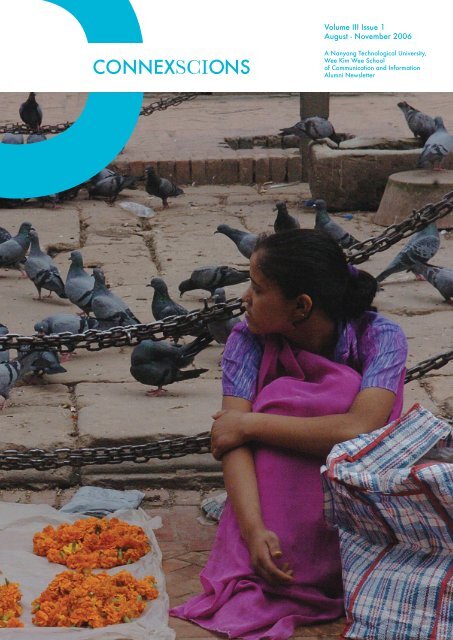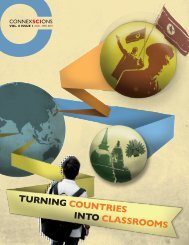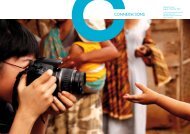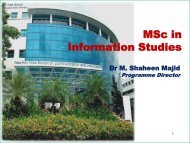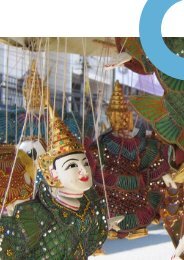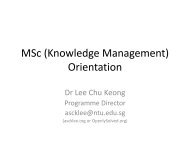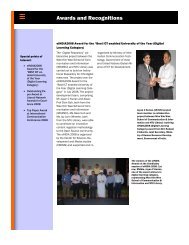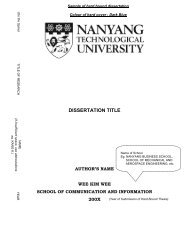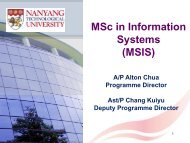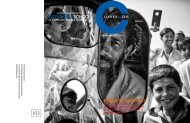Connexscions Volume III Issue 01 Aug - Nov 2006 - WKWSCI Home
Connexscions Volume III Issue 01 Aug - Nov 2006 - WKWSCI Home
Connexscions Volume III Issue 01 Aug - Nov 2006 - WKWSCI Home
You also want an ePaper? Increase the reach of your titles
YUMPU automatically turns print PDFs into web optimized ePapers that Google loves.
<strong>Volume</strong> <strong>III</strong> <strong>Issue</strong> 1<br />
<strong>Aug</strong>ust - <strong>Nov</strong>ember <strong>2006</strong><br />
CONNEXSCIONS<br />
A Nanyang Technological University,<br />
Wee Kim Wee School<br />
of Communication and Information<br />
Alumni Newsletter<br />
1
CONTENTS<br />
Credits<br />
Art Directors<br />
Hsu Lin<br />
Shalwa Md. Taib<br />
Editors<br />
Rebecca Ye<br />
Stephanie Tan<br />
Project Managers<br />
Jasmine Lee<br />
Anisha Baghudana<br />
9<br />
Chair’s Message 4<br />
Awards & Recognition 6<br />
Features 8<br />
Projects & Publications 12<br />
16<br />
Writers &<br />
Layout Team<br />
Anisha Baghudana<br />
Kenneth Chia<br />
Choo Jingyi<br />
Sandrine Gautier<br />
Hsu Lin<br />
Jennifer Law<br />
Dunstan Lee<br />
Jasmine Lee<br />
Lee Huishi<br />
Angeline Leow<br />
Vu Nguyen Binh Phuong<br />
Renita Ong<br />
Rachel Seet<br />
Shalwa Md. Taib<br />
Stephanie Tan<br />
Sarah Teo<br />
Gladys Wong<br />
Rebecca Ye<br />
Advisors<br />
Ms Lim Kim Yang<br />
Dr Angela Mak<br />
Dr Yeoh Kok Cheow<br />
Postgrad News 19<br />
Teachers’ Notes 22<br />
Working Life 26<br />
Class Notes 28<br />
@Brewerks 31<br />
On the Front & Back Cover:<br />
Photo Courtesy of Assistant Professor Shyam Tekwani<br />
11 8<br />
Photo by Dr Irene Pollach<br />
Special Thanks<br />
Dr Ang Peng Hwa<br />
Dr Kavita Karan<br />
Dr Lee Chun Wah<br />
Mr Shyam Tekwani<br />
Mr Ng Heng Ghee<br />
2 3
CHAIRʼS MESSAGE<br />
Increasing International<br />
Collaborations for SCI<br />
By Dunstan Lee and Choo Jingyi<br />
Dr Ang Peng Hwa.<br />
In previous issues of this newsletter, I had<br />
written about two of the three essential<br />
elements that mark a great university:<br />
good infrastructure and good students. In<br />
this issue, I now dwell on what the School<br />
is doing in pursuit of the third element<br />
— good faculty.<br />
In many research universities, poor teaching<br />
is tolerated. Not so at NTU and SCI. Save<br />
those who did not do research, all the<br />
teaching-award winners have also won prizes<br />
and recognition in research.<br />
First teaching: NTU began as a university<br />
focusing on teaching that is still in the<br />
process of moving towards a research<br />
university. So considering our roots, the<br />
various rankings comparing us to research<br />
universities actually show NTU in very<br />
good light. As one of two public universities,<br />
NTU has to ensure that it does not climb the<br />
global rankings at the expense of the only<br />
resource of Singapore — Singaporeans.<br />
Second research: the university sector in<br />
Singapore is gearing itself towards research.<br />
There is an eco-system needed to create the<br />
environment conducive for research. When I<br />
first became dean, I thought that there were<br />
only a few areas that one needed to look at<br />
to create such an environment. I was wrong.<br />
There are many things that one needs to<br />
look at: funding for research, funding to<br />
support conference travel for the research,<br />
assigning classes that align with faculty<br />
interest, reducing administrative workload so<br />
that faculty can spend their creative<br />
energies on research, creating<br />
opportunities for visitors to present their<br />
research, etc. Within each of those areas,<br />
there is always room to improve.<br />
But focusing on the teaching and research<br />
ability of potential faculty is still not enough.<br />
There is a third factor important enough<br />
even for faculty to sacrifice some salary for<br />
it. And that is the collegiality of the faculty.<br />
According to a recent survey, faculty are<br />
prepared to take a lower pay to join a more<br />
collegial faculty.<br />
From my travels to look at various<br />
universities and programmes, the very<br />
strongest programmes are those run by the<br />
happiest people in a good university. In such<br />
places, there was a sense of progression of<br />
things looking up, and a very palpable sense<br />
that students, faculty and alumni are proud<br />
of their programme and their university.<br />
To what extent have we managed to rise<br />
above that bar we have set for ourselves<br />
In the last few years, we have formalised the<br />
hiring procedures to hire faculty. Shortlisted<br />
candidates are flown to Singapore for a<br />
presentation to the faculty and research<br />
students. They meet faculty from the<br />
Division where they may be placed. Then<br />
there is a formal interview with me, the<br />
Head of Division where the person may be<br />
placed, and a senior faculty from another<br />
School for benchmarking.<br />
The process has been useful: we have<br />
rejected people who on paper would have<br />
looked highly suitable. Among those we<br />
Photo by Dunstan Lee<br />
have rejected have been PhDs from top<br />
universities in the US, including the Ivy<br />
League.<br />
Of those whom we have hired, increasingly<br />
they have been strong in research, in<br />
teaching and also in coming forth with ideas<br />
to bring the School to the next level of<br />
excellence.<br />
The amount of research funds obtained by<br />
faculty has risen. There are more research<br />
grants obtained by faculty and there is<br />
greater recognition for the research done.<br />
More faculty are winning awards for their<br />
research and are publishing in top-rated<br />
journals.<br />
As for the collegial spirit, the strongest<br />
endorsement comes from the recent winning<br />
bid by the School to host the annual<br />
conference of the International<br />
Communication Association (ICA) in 2<strong>01</strong>0.<br />
One of the factors behind the win was the<br />
teamwork of the School.<br />
This coming year, we have advertised for 10<br />
positions. If you know of academics who<br />
meet our criteria, do encourage them to<br />
apply. All we need are 10 more good faculty,<br />
for now.<br />
Best regards,<br />
Ang Peng Hwa<br />
Chair<br />
Expanding international relations,<br />
particularly in the Asia Pacific<br />
region, is now a major thrust of SCI,<br />
and the School is becoming increasingly<br />
involved in international collaborations.<br />
In April, the Division of Information<br />
Studies hosted the Asia-Pacific Conference<br />
on Library and Information Education and<br />
Practice, where participants focused on how<br />
to prepare information professionals for<br />
leadership in the new age. Then in July, SCI<br />
organised the 4th Annual Chinese Internet<br />
Research Conference (CIRC) through the<br />
Singapore Internet Research Centre (SiRC),<br />
the first time the conference had been held<br />
outside the United States. The meeting<br />
brought together top scholars, researchers<br />
and practitioners from around the world<br />
to discuss the impact of the Internet on<br />
Chinese culture.<br />
Chair of SCI Associate Professor Dr Ang<br />
Peng Hwa, who was appointed by UN<br />
Secretary-General Kofi Annan to serve on<br />
the Working Group on Internet Governance<br />
(WGIG) committee in 2004, at the time of<br />
writing, is involved in organising an Internet<br />
governance symposium to be held in late<br />
October this year. The symposium is<br />
intended to be an annual affair, meeting on<br />
the eve of the UN Internet Governance<br />
Forum. The School is also one of the<br />
sponsors of the symposium.<br />
“Thanks to participation at these high-level<br />
international meetings, we have a high<br />
profile globally on Internet issues in the<br />
academic world,” Dr Ang said. “We want to<br />
maintain that level of visibility.”<br />
More major international conferences are in<br />
the pipeline for SCI.<br />
Come June, the School will co-host with the<br />
Asian Media Information and<br />
Communication Centre (AMIC) the first<br />
World Journalism Education Congress<br />
(WJEC). This unprecedented event will be<br />
organised in collaboration with the<br />
Association for Education in Journalism and<br />
Mass Communication (AEJMC) and leading<br />
journalism education associations from<br />
around the globe.<br />
Strong institutional support and better<br />
teamwork has also helped SCI win the bid to<br />
host the prestigious annual conference of the<br />
International Communication Association<br />
(ICA) that will be held in 2<strong>01</strong>0.<br />
“Winning the bid for this was particularly<br />
satisfying,” Dr Ang said. “We had strong<br />
competition from Hong Kong and Osaka.<br />
But a key factor, I was told, was the strong<br />
teamwork in the faculty that the director of<br />
the Association saw.”<br />
With SCI having increased exposure on the<br />
international front, Dr Ang is confident this<br />
will further strengthen the reputation of<br />
SCI, its faculty and NTU as a whole.<br />
“With the faculty seen to be doing and<br />
promoting cutting-edge research, there<br />
would then be increased visits by researchers<br />
and professors,” Dr Ang said. “In turn, this<br />
will attract more quality faculty to join SCI.”<br />
Professor Dr Schubert Foo (centre) and Associate Professor Dr Shaheen Majid (right) at the Asia-Pacific<br />
Conference on Library and Information.<br />
Photo by Mr Ng Heng Ghee<br />
4 5
AWARDS & RECOGNITION<br />
Postgrad Winners<br />
By Stephanie Tan<br />
Prying Open<br />
Creative<br />
Minds<br />
By Kenneth Chia<br />
Despite the enveloping smog outside,<br />
I was a man with a mission: to<br />
uncover the secret to producing<br />
award-winning ads. I sidestepped the<br />
Crowbar award trophies to take up position<br />
to hear the names of the winners of those<br />
coveted trophies and watch them receive<br />
their accolades.<br />
Among the prize recipients were Ms Guo<br />
Yi Xian (<strong>2006</strong>) and Mr Adrian Yeap,<br />
a final year Public and Promotional<br />
Communication (PPC) student. Yi Xian<br />
clinched one Gold, one Silver and two<br />
Bronze awards in the ambient media,<br />
non-transit, direct-mail, posters (non-transit),<br />
categories while Adrian swept eight Bronze<br />
awards in the posters (transit/non-transit)<br />
print/press, and copywriting categories.<br />
The Crowbar Awards, organised by the<br />
Association of Accredited Advertising<br />
Agents (4As), was inaugurated in 20<strong>01</strong>. In<br />
that year, then-SCI student Mr Raymond<br />
Chin (20<strong>01</strong>) won the coveted Best of Show<br />
award. This year’s event received a<br />
record-breaking number of entries: 1,337 in<br />
all, so competition was tough.<br />
When I congratulated Yi Xian and Adrian<br />
on their achievements, Yi Xian jested: “I’ve<br />
never been featured in any SCI publication<br />
during my four years in school. I’m glad I<br />
didn’t miss this last chance!”<br />
“I’m definitely elated!” exclaimed Adrian.<br />
He said that he feels he’s made for<br />
advertising, especially after working under<br />
some brilliant creative designers during<br />
his four-month professional internship at<br />
advertising agency, Young & Rubicam.<br />
“Their ideas were just inspiring,” he added.<br />
Asked how he planned to celebrate the<br />
Crowbar Awards acclamation for his creative<br />
work, Adrian announced his plans for the<br />
night: “I’m going to celebrate by going home<br />
to do my Final Year Project (FYP).” But he<br />
added that he had no intention of resting on<br />
his laurels as “the advertising industry places<br />
importance on awards”. Yi Xian echoed<br />
the belief that one cannot afford to become<br />
complacent. She believes her next piece of<br />
work will be her best — and this coming<br />
from someone whose FYP garnered an “A”<br />
grade.<br />
And the formula for coming up with good<br />
ads Adrian replied: “There are no rules.<br />
And even if there are, they are meant to be<br />
broken.”<br />
Promising<br />
Journalist,<br />
Valerie<br />
By Anisha Baghudana<br />
Business reporter for TODAY<br />
newspaper Ms Valerie Law (2002) has<br />
won the Most Promising Journalist<br />
Award <strong>2006</strong> at the Securities Investors’<br />
Association’s 7th Investors’ Choice Awards.<br />
Adjudged by a panel of finance specialists,<br />
her article, titled “CPF and your Mortgage”,<br />
garnered much critical appreciation for the<br />
valuable information it provided readers<br />
about the pitfalls of using CPF savings for<br />
availing home loans. Valerie said she did not<br />
expect the award but was encouraged by it.<br />
“It is not easy for business reporters to find<br />
scoops as there is a lot of confidentiality,” she<br />
said. “So it feels nice to be acknowledged for<br />
your efforts.”<br />
Valerie’s clear and impactful writing style<br />
has been the trademark of her column in the<br />
“Wealth” section of TODAY for the last two<br />
years. She said: “Once I sit down to write, I<br />
focus on why the issue is interesting for<br />
people. The idea is to convert the figures<br />
into what it really means for the layman.”<br />
Valerie has one bit of advice for budding<br />
journalists from SCI: “There are journalists<br />
who are happy reporting from the surface<br />
level. That is shallow reporting. Don’t be<br />
like that. Dig deep. Find interesting angles<br />
to your story. And follow your heart even if<br />
there seem to be barriers. Be committed to<br />
your story.”<br />
This issue’s connexscions presents<br />
four academic talents from SCI’s<br />
Masters programmes 2005/<strong>2006</strong>.<br />
Singapore’s media industry has recognised<br />
these talents with accolades. These young<br />
women and man are:<br />
Adrian Khoo<br />
Although Mr Adrian Khoo had to juggle<br />
a demanding career, family and school, he<br />
still managed to top his cohort, earning him<br />
this year’s LexisNexis Gold Medal Award.<br />
Within the last 10 years, he has held three<br />
different positions at the work place; each<br />
time with increasing responsibilities. He is<br />
currently the Regional Head of Graduate<br />
Development in Asia Pacific at Barclay<br />
Capital. He said that this career move is<br />
largely due to his Masters education in<br />
Knowledge Management, which “added<br />
discipline and ordered thought-process<br />
allowed me to take advantage and react<br />
quickly to arising opportunities that I<br />
otherwise may have missed completely.” He<br />
described SCI as a warm and friendly place,<br />
and remembers the many social outings after<br />
class to network and to continue debates.<br />
Loh Su Hsing<br />
Though she had been the top student in her<br />
cohort twice, being awarded the Pearson<br />
Education Gold Medal Award for academic<br />
excellence pleasantly surprised this graduate.<br />
She credited this accolade to “approachable<br />
lecturers like Dr Wayne Fu, Dr Cherian<br />
George and Dr Randolph Kluver, whose<br />
doors were always opened, be it for a chat<br />
or for consultation; and friendly classmates<br />
who turned out to be great project mates<br />
as well.” Furthermore, she met her fiancé<br />
in the programme! She has left her job at<br />
Photo Courtesy of Mr Adrian Khoo<br />
a government statutory board to join her<br />
fiancé in Hong Kong, and is also currently<br />
travelling around the world.<br />
Chew Siew San<br />
Ms Chew Siew San is hardly the<br />
stereotypical librarian that I have<br />
encountered before. Instead, she is a shy<br />
and affable young woman who initially<br />
refused to have her picture taken. She was<br />
also SCI’s MSc in Information Studies best<br />
graduating student, <strong>2006</strong>, who has recently<br />
been awarded the Library Association<br />
Gold Medal Award for her outstanding<br />
performance. The children’s librarian at<br />
National Library Board attributes this<br />
achievement to the warmth and openness<br />
of SCI’s professors and students, or what<br />
she called “an SCI culture”. She described<br />
SCI as a place where “students are not so<br />
hung up about grades... (who are) open to<br />
sharing ideas” and “lecturers are committed<br />
and patient”, something for which she is<br />
thankful.<br />
Ong Shao Ying<br />
Receiving the Media Development Authority<br />
Book Prize is an affirmation and recognition<br />
of all the hard work and diligence put into<br />
completing this project, said Ms Ong Shao<br />
Ying, best graduating Master of Mass<br />
Communication student in 2005/<strong>2006</strong>. She<br />
was also awarded two tuition scholarships<br />
and served as a research and teaching<br />
assistant while studying in SCI.<br />
Shao Ying cherishes her time in SCI — good<br />
friends, open and interactive classes, and the<br />
application-based programme. She cheekily<br />
added: “I surely do not miss canteen food<br />
and the long drive to school daily.”<br />
Photo Courtesy of Ms Loh Su Hsing<br />
Photo Courtesy of Ms Chew Siew San<br />
Photo Courtesy of Ms Ong Shao Ying<br />
From left (clockwise): Mr Adrian Khoo, Ms Loh Su Hsing,<br />
Ms Chew Siew San and Ms Ong Shao Ying.<br />
6 7
FEATURES<br />
SCI<br />
Welcomes<br />
<strong>2006</strong> WKW<br />
Professor<br />
By Rebecca Ye<br />
Joining the ranks of professors John<br />
Merrill, Theodore Glasser and the late<br />
Everett Rogers, is Professor Joseph D.<br />
Straubhaar, the most recent recipient<br />
of the Wee Kim Wee Distinguished<br />
Professorship in Communication Studies.<br />
The renowned professor is Amon G. Carter<br />
Centennial Professor of Communications<br />
in the Department of Radio-TV-Film, and<br />
Director of the Center for Brazilian Studies<br />
within the Lozano Long Institute for Latin<br />
American Studies at the University of Texas<br />
(at Austin).<br />
Chair of SCI, Associate Professor Dr Ang<br />
Peng Hwa, who was a student of Professor<br />
Straubhaar at Michigan State University,<br />
said the School had been working to bring<br />
him to SCI. He observed: “As with all top<br />
professors, they often have a full plate. I’m<br />
glad we managed to make it happen this<br />
year.”<br />
Professor Straubhaar’s academic work<br />
spans a wide spectrum. Specialising in<br />
international communication and cultural<br />
theory has also enabled Professor Straubhaar<br />
to share his insights on Singapore’s media<br />
industry with government officials and<br />
representatives from the industry. While<br />
in Singapore, besides the several research<br />
presentations he gave to faculty and students,<br />
he also gave a public lecture titled: “Global,<br />
Hybrid or Multiple Identities in the Age<br />
of Satellite TV and the Internet” that was<br />
well received. He presented research on<br />
what people were choosing to watch, read<br />
and listen to in the brave new world of<br />
technological advancements.<br />
The Wee Kim Wee Professorship was<br />
established on 4 <strong>Nov</strong>ember 1995 as a tribute<br />
to the late Dr Wee for his contributions<br />
to the country and the communication<br />
discipline. The Professorship has enabled<br />
the School to invite senior professors to meet<br />
with students and faculty.<br />
SCI Graduate<br />
Scales Great Heights<br />
By Rachel Seet<br />
It took a simple e-mail from a friend to spark off a<br />
life-long mountaineering interest for SCI graduate,<br />
Ms Esther Tan (2005). Now a key member of the<br />
Singapore Women’s Everest Team 2008 (SWET),<br />
Esther first responded to an email calling out for<br />
sporty women who wanted to climb Mount Everest,<br />
out of her passion for outdoor sports.<br />
Asian Yarns, Austrian-Accented<br />
Pagoda at the Chinese Garden.<br />
Photo by Dr Irene Pollach<br />
The photograph took my breath<br />
away. It was a shot of an endless<br />
spiral of staircase — tangent circles<br />
that swirled in together and culminated at<br />
a faraway point. It took me a moment to<br />
swirl back to reality, and things in the office<br />
came into focus: A laptop; postcards of the<br />
upcoming movie Singapore Dreaming; Dr Irene<br />
Pollach.<br />
I pulled my eyes away from the photograph<br />
the visiting professor had taken in the<br />
pagoda at Chinese Garden, and told Dr<br />
Pollach that at the rate she was travelling<br />
around and snapping such magnificent<br />
photographs, she would have enough for an<br />
art exhibition by the end of her career.<br />
Although based in the Vienna University of<br />
Economics and Business Administration in<br />
Austria, this prolific researcher and writer<br />
has spent periods in the tertiary institutions<br />
of many countries, including the University<br />
of Illinois and the University of Michigan.<br />
She was in Singapore once, for a half-day<br />
tour, and that was when she knew she had to<br />
come back again.<br />
This time around, Dr Pollach came to SCI<br />
as a Singapore Internet Research Centre<br />
By Kenneth Chia<br />
(SiRC) visiting fellow, conducting research<br />
on the readership of corporate websites. She<br />
presented a seminar on her research topic<br />
to faculty staff and postgraduate students,<br />
and also a lecture on communication<br />
technologies to the undergraduate cohort.<br />
During her lecture on communication<br />
technologies, Dr Pollach mentioned the<br />
photo-sharing website FlickR, of which<br />
she is a member. Using the name of her<br />
street back home as her alias, she shares her<br />
photos of Hawaii, Italy and, now, much of<br />
South-East Asia including Vietnam, Laos,<br />
Thailand, Malaysia and Singapore, among<br />
other countries, with the online community.<br />
Her “virtual second home”, Dr Pollach<br />
called it.<br />
A trove of indigenous yarns, I thought.<br />
Upon asking why she chose to visit us among<br />
the many other communication institutions,<br />
Dr Pollach replied that she thinks SCI<br />
represents the best Asia has to offer. She<br />
added that the physical environment in<br />
NTU makes one feel more relaxed, citing the<br />
abundant green, the undisturbed quiet and<br />
the lack of cars in the university. “I think it’s<br />
a good place to recharge your batteries.”<br />
Ms Esther Tan (right most), with SWET, on their recent expedition.<br />
Photos Courtesy of Ms Esther Tan<br />
“I was into trekking and sailing, but was never an expert in climbing<br />
before I joined the team,” she said. “It was a time when my desire to<br />
do outdoor sports and love for nature were answered in this call for<br />
Everest. My reasons for being in the team have changed quite a bit,<br />
from a rather innocent view of the mountains to a deep respect for<br />
them.”<br />
Despite having done gym work and training on her own before<br />
joining the team, the initial SWET training sessions proved to be<br />
nowhere near easy for Esther. They included long runs of up to<br />
20km, load-ferrying up 30-storey flats with up to 18kg loads, and<br />
four-hour walks from MacRitchie to Bukit Timah carrying loads of<br />
about 15kg. The physical training took place three to four times a<br />
week. She said: “Everyday is a time trial to cope with training and<br />
everything else in life.”<br />
Back then during her final year at SCI, Esther worked on her Final<br />
Year Project (FYP) while training with SWET. She thanked her<br />
very understanding FYP project mates who accommodated her<br />
tight schedule. She now juggles work as a copywriter at OgilvyOne<br />
Worldwide with the same weekly physical training.<br />
This July, SWET returned from a successful conquest of Muztag Ata<br />
in Xinjiang, China, to become the first all-women team in<br />
South-East Asia to scale a 7,500-metre mountain. Esther was first<br />
among the five who made it to the summit. Faith and perseverance<br />
kept her going to achieve this. She said: “[T]he seemingly endless<br />
route is extremely draining on the mind. I kept praying and told<br />
myself that as long as God lets me put one foot in front of the other,<br />
I will keep going.”<br />
SWET will be going on their next expedition to the 8,2<strong>01</strong><br />
metre-high Cho Oyu in Tibet next <strong>Aug</strong>ust. These expeditions are<br />
part of their training before attempting the world’s highest summit,<br />
Mount Everest, in 2008.<br />
8 9
International Exchange Students in SCI<br />
By Jasmine Lee and Sandrine Gautier<br />
Sneak peek of Mr Ng Heng Ghee at work.<br />
Photos by Hsu Lin<br />
In recent years, SCI’s connections with international students<br />
have been expanding significantly, through overseas programmes<br />
such as INSTEP (INternational STudent Exchange Programme)<br />
and GIP (Global Immersion Programme). As well as giving<br />
Singapore-based students the chance to study and work beyond local<br />
shores, these programmes attract international students from all over<br />
the world to SCI for study periods.<br />
Our international friends bring with them their own unique<br />
perspectives and share their experiences and ideas with classmates<br />
and teaching staff in SCI. connexscions caught up with some of them<br />
to find out about their experiences so far: Mr Alexandre Besson,<br />
Mr Adrien da Cunha Belves, Mr Alexis Larmurier and Mr Gilles<br />
Bassière are from France; Ms Jessica Napier is from the US; and Mr<br />
Yin Qi is from China.<br />
How different is studying in SCI compared with your<br />
university at home<br />
relationship between professors and students, and the dynamism<br />
and interactivity of the tutorials. The students also commented how<br />
impressed they are with SCI’s modern technology and facilities. For<br />
example, Yin Qi noted that SCI has all the facilities needed for all<br />
aspects of communications studies. For Adrien, he was surprised<br />
by the proliferation of computers around the school: “Here you<br />
see computers everywhere. Whereas France is more traditional<br />
academically, (so) there are not as many computers where I study.”<br />
Most of these international students agreed their overseas study<br />
experience will be valuable for their future careers. Jessica said:<br />
“This exchange could be extremely useful for my career, because<br />
economy and business focus are moving to Asia.” For Adrien and his<br />
friends, exposure to the political scene in Singapore offered a new<br />
and interesting perspective to their studies. They were particularly<br />
fascinated by Singapore’s respect for its colonial heritage — the<br />
French are not quite so proud of their colonial past!<br />
Behind the Scenes<br />
By Hsu Lin and Vu Nguyen Binh Phuong<br />
Academically, the atmosphere and modular emphasis can be quite<br />
different for foreign students. Jessica noted that a key change for<br />
her was the increased focus on practical work: “In the US, courses<br />
usually emphasise textbook learning, so a good deal of time is spent<br />
reading.”<br />
We see them everyday around the<br />
school helping students with the<br />
loaning of equipment and the<br />
provision of technical assistance. They have<br />
become a permanent fixture in the School,<br />
and without them SCI would not be the<br />
same. This diligent group of people working<br />
“behind-the-scenes” is our school’s very own<br />
IT and audio-visual team.<br />
A good working environment<br />
“The experience is great,” said Mr Tan<br />
Boon Huat, one of the audio-visual system<br />
executives who has been working in SCI<br />
for about six years. Affectionately known<br />
as Uncle Tan by students, he adds: “We<br />
deal with youngsters every day so we also<br />
feel young. It is fun because every day, I am<br />
doing something different.”<br />
Senior Manager (Media) Mr Vincent<br />
Teo, who has just received his 10 year<br />
service award, shares the same sentiments:<br />
“Working here is great because I have very<br />
good staff here, very friendly and supportive<br />
colleagues. We are from the AV side but we<br />
also deal with the IT side and we support<br />
each other.”<br />
Through our conversation, it is obvious<br />
that the IT team enjoys working with the<br />
students. Mr Andrew Lim, IT executive,<br />
said: “It is a good environment here because<br />
of the student-staff interaction.” Just this<br />
semester, the AV department has moved<br />
to a new home located just behind the<br />
School. “I think it’s very convenient now<br />
and I think my staff really appreciates the<br />
School building this space for us,” said Mr<br />
Teo, whose previous office was located on<br />
the third floor. “In fact, moving myself down<br />
here together with them, we feel more closeknit<br />
and we can discuss openly and get things<br />
done faster.”<br />
Special relationships with students<br />
Throughout the years, the IT team has been<br />
giving unconditional support and care to the<br />
students. “If anything goes wrong when they<br />
are filming in school, we always try our best<br />
to help them,” said Uncle Tan. “If they are<br />
filming outside, we try to help them over the<br />
phone.”<br />
In addition, Mr Teo has been actively<br />
pushing for high-definition (HD) technology<br />
to be made available in the school. “We<br />
know the direction we are going. We now<br />
have three high-definition cameras in the<br />
studio and I am looking into getting at least<br />
two HD location cameras this year for<br />
Final Year Projects (FYP),” said Mr Teo.<br />
The provision of these facilities will allow our<br />
students to produce more sophisticated work<br />
and be on par with the industry’s standards.<br />
It is clear that students greatly appreciate the<br />
technicians lending them a helping hand. Mr<br />
Lim said: “We try our best to cater to their<br />
needs and they reciprocate by giving us cards<br />
and hand-made cakes and cookies.”<br />
Mr Teo, who interacts most with the FYP<br />
groups, said: “I get to know the EBM<br />
(Electronic and Broadcast Media) students<br />
before they graduate and some of them still<br />
come back to SCI to visit us, which is what<br />
we like most.”<br />
Mr Hin Ah Pin.<br />
Photo byVu Ngyuen Binh Phuong<br />
Mr Hin Ah Ping, senior IT executive, who<br />
has been working in SCI for the past 12<br />
years, has left the school in order to devote<br />
more time to his spiritual practice. He said:<br />
“I have many fond memories and I will miss<br />
my colleagues and my friends.”<br />
For Gilles, the biggest change was getting used to more interaction<br />
with lecturers. He said: “In France, the timetable is really busy so the<br />
teachers try to cram a lot of stuff into each session, which does not<br />
always leave much time for personal contact (with lecturers).”<br />
Another aspect the foreign students enjoy is the chance to study<br />
different topics. Coming from a political science university in<br />
Toulouse with his friends, Adrien and Alexis, Alexandre said he had<br />
not studied subjects such as Web Design. Thus he jumped at the<br />
chance to do such courses and learn something radically different.<br />
Alexandre, Adrien and Alexis enjoying themselves with a cold beer each.<br />
Photo by Jasmine Lee<br />
Despite the challenges in adapting, all the students felt that they had<br />
settled in well to the SCI teaching style, and they were particularly<br />
thankful to their Singaporean classmates and lecturers, who had<br />
been extremely helpful and accommodating. Alexis commented:<br />
“The teachers here help you when you need it, and are always<br />
checking with you that you are okay and I feel very much at ease.”<br />
What are your impressions of SCI so far<br />
Most of the students said they enjoyed the warm and relaxed SCI<br />
environment. Alexis in particular praised the close and informal<br />
Jessica, Gilles and Yin relaxing in front of Lee Kong Chian lecture theatre.<br />
Photo by Sandrine Gautier<br />
How else are you experiencing Singapore life, apart from<br />
your studies<br />
A study abroad programme entails more than just hitting the books;<br />
it is a cultural exchange bubbling with all the richness and exciting<br />
prospects of a different lifestyle. The international students we<br />
talked to are thoroughly enjoying their experiences in discovering<br />
Singapore and all she has to offer.<br />
On one outing, the French triumvirate (three persons) of Alexandre,<br />
Alexis, and Adrien discovered chili. Alexandre, who wrinkled his<br />
nose at the thought of spicy food, explained that in France, chefs<br />
do not use chili in cooking as it masks the natural fragrance of the<br />
food. Adrien, however, excitedly proclaimed: “I came to Singapore<br />
and discovered chili. I’ll definitely bring some back to France. I love<br />
chili.”<br />
What impressed Alexandre most is Singapore’s cleanliness. He<br />
said, “It may sound like a cliché but it is really very, very clean<br />
here!” Adrien muses about another aspect of Singapore — its hot<br />
and humid weather, “It is so hot in Singapore, but once you step<br />
into classrooms or métro (MRT), it’s only about 15 degrees; so hot<br />
outside, freezing cold inside!”<br />
Such experiences are what make an exchange trip truly worthwhile<br />
— taking lessons and courses that enable one to enrich oneself and<br />
learn more about another country, as well as to explore and integrate<br />
into a very different culture. There’s little doubt these students will<br />
take back a whole lot of memories from SCI.<br />
10 11
PROJECTS & PUBLICATIONS<br />
FYPs Win<br />
Kudos in...<br />
Hong Kong<br />
By Jasmine Lee and Vu Nguyen Binh Phuong<br />
Singing is more than a leisure activity; it can also be a way of<br />
connecting with the underprivileged. This is a concept taken<br />
up by one of the five Final Year Project (FYP) groups that<br />
presented at the Hong Kong Conference this year, the first time SCI<br />
has such a strong showing in a single international conference.<br />
The group’s project, titled “Sing Melody Bus Tour Campaign”, is a<br />
campaign for local children’s choir, Sing Melody Children’s Choir.<br />
The objective is to raise awareness of the choir and to debunk myths<br />
that singing lessons are only for the privileged. The choir is one of<br />
the first, if not the only, children’s choirs in Singapore to actively<br />
promote music to the less privileged.<br />
“Frenz4Frenz Youth Empowerment Campaign”, a series of<br />
initiatives such as youth camps and online portals to address juvenile<br />
delinquency. While having the opportunity to present their paper in<br />
Hong Kong was rewarding, Ms Farin Salleh (<strong>2006</strong>), a group member<br />
working on the Youth Empowerment Campaign, feels that what was<br />
more gratifying was the sincerity to want to make a difference.<br />
“It was truly an inspiring experience and we were very honoured to<br />
be a part of it,” she said. “Those who attended the conference had<br />
big hearts, each with their own story to tell and each wanting to do<br />
something for others.”<br />
Second<br />
Win for CR<br />
Students at<br />
SYMC<br />
By Renita Ong<br />
Inspecting<br />
HATCHfest<br />
By Choo Jingyi<br />
Mr Chong Yew Meng (far right) and Ms Tham Yee Lin<br />
(centre) with a friend in the US.<br />
Photo Courtesy of Mr Chong Yew Meng<br />
The group with Dr Benjamin Detenber (centre) at their convocation.<br />
When they submitted their term<br />
paper to the Singapore Youth and<br />
Media Conference (SYMC) last<br />
semester, Ms Koh Gui Qing, Mr Lim Mun<br />
Pong, Mr Mohammed Jalees and Mr Teh<br />
Joo Lin (<strong>2006</strong>) never expected they would<br />
win the first prize of $2,500. This win marks<br />
the second time that SCI students, from the<br />
Division of Communication Research, have<br />
clinched an award at the conference.<br />
Currently in its second year, the SYMC is<br />
an international media conference which<br />
allows youths to present their views on issues<br />
pertaining to the society and media. The<br />
theme for this year’s conference was “Pay It<br />
Forward with Pop Culture.”<br />
F<br />
inal Year Project (FYP) film,<br />
Inspector X and The Eternal City was<br />
recently selected to compete in the US<br />
HATCHfest <strong>2006</strong> in October. Having their<br />
work chosen for this festival is an honour<br />
for the team consisting of Mr Chong Yew<br />
Meng, Mr Ng Shao Da and Ms Tham Yee<br />
Lin (<strong>2006</strong>).<br />
Assistant Professor Dr Pieter Aquilia, who<br />
supervised the project, said, “I am very<br />
proud of Yee Lin, Shao Da and Yew Meng.<br />
They are amazingly talented and we laughed<br />
a lot doing the project.” She described Yew<br />
Meng, who came up with the solid script, as<br />
a professional director, Shao Da as a specialist<br />
in digital effects and cinematography, and<br />
Yee Lin as a natural producer.<br />
HATCHfest is a film festival which aims<br />
to mentor and promote new filmmakers,<br />
giving students the opportunity to network<br />
with US industry professionals. Inspector X<br />
and The Eternal City, a film that combines 3D<br />
graphics and live action, competed in the<br />
Photo Courtesy of Mr Lim Mun Pong<br />
The group submitted their paper titled<br />
“Politicking in Singlish” for the New Media<br />
topic category. This research paper studies<br />
how the use of a particular form of English<br />
in political speech affects the audience’s<br />
perception towards the speaker, in terms of<br />
likeability and credibility.<br />
The group expressed their initial surprise<br />
when they won as they had only expected<br />
to receive a consolation prize. Mohammed<br />
Jalees, speaking for the group, said: “Besides<br />
the prize money, we also feel honoured to see<br />
SCI receive accolades for intellectual<br />
discourse and out-of-the-box thinking.”<br />
Groundbreaker category, a special category<br />
for particularly innovative projects.<br />
Yew Meng explained the film was inspired<br />
by recent current events in Singapore,<br />
particularly the decision to make room for<br />
“integrated resorts” comprising casinos.<br />
The film is a tongue-in-cheek noir detective<br />
thriller set in the future, in a world<br />
dominated by greed and sadness. When<br />
terrorism threatens the casino, a police<br />
inspector and his sidekick are brought in to<br />
investigate. The trail leads them on a wild<br />
goose chase and they eventually uncover a<br />
truth that is too much for all to bear.<br />
Although Inspector X did not win the award,<br />
the team felt that just being at HATCHfest<br />
was itself a prize. The trip turned out to be<br />
both enlightening and inspirational for Yew<br />
Meng and Yee Lin, who attended the<br />
festival. Yew Meng said: “I feel inspired to<br />
keep being creative, to seize opportunities<br />
and to hold on to dreams.”<br />
Ms Teo Weiping (<strong>2006</strong>) of the Sing Melody campaign succinctly<br />
sums up her group’s experience in the Hong Kong Conference: “We<br />
have reaped rewards more in personal development than just beefing<br />
up our portfolio.”<br />
Other FYPs presented in Hong Kong also addressed youth-centred<br />
issues. They included an interactive problem solving book for<br />
at-risk youths called U-Turn: The Journey Begins, and<br />
A Project With a<br />
Purpose<br />
By Rebecca Ye<br />
While many of their classmates vexed over what to do for<br />
their Final Year Projects (FYP), Ms Gea Swee Jean, Ms<br />
Liza Lin, Ms Wee Sui Lee and Ms Yeo Yi Xin, journalism<br />
graduates from the class of <strong>2006</strong>, embarked on an assignment that<br />
allowed them to not only write a gripping and meaningful piece of<br />
journalism, but also to serve a real social cause.<br />
We Are Family: Stories of People with Disabilities, a non-profit<br />
publication consisting of photos and narrative profiles of subjects<br />
and their families, is the outcome of the quartet’s efforts to raise<br />
awareness of an aspect of our society often overlooked.<br />
Launched at the National Library this June, the book has managed<br />
to raise almost $14,000 for The Spastic Children’s Association of<br />
Singapore.<br />
During the year of penning this book, the team spent time with<br />
individuals with disabilities and their families, observing and<br />
participating in their lives at activities.<br />
“We had to immerse in their lives and tread the fine line of being a<br />
friend and yet a journalist,” said group member Sui Lee. “All these<br />
have helped us in our reporting — and affirmed our belief that we<br />
aren’t just parachute journalists (reporting stories without<br />
understanding the context or cultures of a story).”<br />
Group leader Swee Jean added that through the course of telling<br />
these stories, their eyes have been opened to the issues people with<br />
disabilities face. She said: “They have taught us so much with their<br />
honesty, generosity and sheer determination in the face of adversity.”<br />
Ms Goh Yun Ting and Mr Jeffrey Ler of the U-Turn group at the conference.<br />
Photo Courtesy of Mr Jeffrey Ler<br />
From left to right: Ms Yeo Yi Xin, Ms Wee Sui Lee, Ms Gea Swee Jean and Ms Liza<br />
Lin at their book-signing event.<br />
Photo Courtesy of Ms Yeo Yi Xin<br />
The team hopes the book will serve as a useful source of information<br />
for the various stakeholders who are working to address the needs of<br />
people with disabilities in Singapore.<br />
As Assistant Professor Dr Cherian George, their project supervisor,<br />
wrote in the book’s foreword, “This is a book by four young<br />
Singaporeans who refused to look away and utilised their<br />
communication skills and abilities to raise consciousness for social<br />
causes.”<br />
To buy a copy of the book in support of the cause, contact Ms Melissa Rodrigues<br />
at the Spastic Children’s Association of Singapore at 65855602 or email her at<br />
melissa_hq@spastic.org.sg.<br />
12 13
What Do They<br />
Mean<br />
to You<br />
By Gladys Wong<br />
Love<br />
Communication<br />
Photos by Ms Elizabeth Teo<br />
Strangers<br />
Through her pictures, Ms Elizabeth Teo, a final<br />
year student, wanted to convey her view that<br />
love is most genuine, simple and pure in a family.<br />
Yet, in a fast-paced material world where<br />
individualism takes centre stage, family affection is<br />
becoming taken for granted, and thus neglected.<br />
Photos by Mr Winson Teo (top) and Ms Margareta Astaman (below)<br />
Four photojournalism students were challenged to use photos to express what the<br />
essence of Communication, Love and Strangers means to them. These are some<br />
of their ideas.<br />
Strolling along the beach, Elizabeth captured these<br />
moments of love between a parent and his child,<br />
and between two young siblings approaching a<br />
stray cat.<br />
Communication is the central focus and theme of SCI students’ studying experience.<br />
The process of communication involves many media, tools and signals. But when<br />
translated to one’s daily living, what does this word “communication” mean to you<br />
For final year student Mr Winson Teo, the way The Body Shop symmetrically laid out<br />
stalls at a local shopping mall was a purposeful way of communicating their<br />
anniversary promotional sale to shoppers and passers-by. He was impressed by the<br />
creativity put in and was certain that anyone walking along the upper levels would<br />
have been drawn to the sale.<br />
W<br />
ho are the strangers in your life<br />
Ms Jean Loo, a final year journalism<br />
student, captured images of two ordinary<br />
people she would have normally walked past without<br />
offering much of a glance. By slowing down and<br />
taking the time to get to know them, she found out<br />
one of them is an 80-year-old money changer, the<br />
other, a Big Sweep ticket seller.<br />
The message Ms Margareta Astaman wanted to highlight, however, was that<br />
communication is everywhere. While an obvious approach may have been to focus on<br />
human communication, Margareta was drawn to ants.<br />
The third year journalism student said: “Ants have always been known for their ability<br />
to communicate and coordinate their work; and ants are everywhere.”<br />
Photos by Ms Jean Loo<br />
14 15
Nepal<br />
Through<br />
the Eyes of<br />
SCI Students<br />
By Gladys Wong<br />
From left (clockwise): Photos by Ms<br />
Neo Xiaobin, Mr Desmond Lim<br />
and Ms Sharon See<br />
The Kingdom of Nepal has been<br />
experiencing historic change<br />
in recent years. Under SCI’s<br />
GO-FAR (Going Overseas For Advanced<br />
Reporting) <strong>2006</strong> programme, 12 final year<br />
journalism students were fortunate to have<br />
the opportunity to visit the landlocked<br />
Himalayan kingdom for two separate<br />
week-long trips, to capture the fascinating<br />
developments taking place in this country.<br />
The students travelled to Kathmandu, the<br />
capital city, as well as the rural areas, to<br />
document and witness the lives of the<br />
Nepalese since the country underwent<br />
political reform. They were led by Assistant<br />
Professor Shyam Tekwani, who explained<br />
that the students took away important<br />
journalistic skills that are not taught in the<br />
classroom. By embedding themselves in<br />
a political hotbed like Nepal, the students<br />
would “experience first-hand, the emotional,<br />
physical and intellectual challenges of<br />
working in a foreign environment.”<br />
The spirit of the Nepalese and the unique<br />
culture of this alluring and exotic Himalayan<br />
kingdom has certainly mesmerised many of<br />
the participants. As Ms Michelle Lee<br />
shared: “It was almost surreal how friendly<br />
and open the people in Nepal are, so much<br />
so that you can just call the finance minister<br />
after dinner, and arrange to meet a big-shot<br />
newspaper the next day after you call him.”<br />
To another member of the team, Ms Cheow<br />
Xinyi, visiting a country that has stark<br />
contrasts from her homeland was an<br />
eye-opener. The sight of cows walking across<br />
the streets and chaotic traffic were scenes she<br />
had only seen or heard of from books and<br />
television before then. Nevertheless, Nepal<br />
has left Xinyi with deep nostalgic feelings: “I<br />
could go on forever about our<br />
wonderful interpreters...walking in Patan<br />
square, passing by crowds of cars, dust,<br />
motorcycles, cows, colourfully-clad<br />
Nepalese, flying kites, bantering about<br />
nothing in particular with the drivers and<br />
shopkeepers — just the plain indescribable<br />
feeling of being right there and then in<br />
Nepal.”<br />
16 17
POSTGRAD NEWS<br />
Final Year Projects<br />
Win Kudos<br />
By Vu Nguyen Binh Phuong<br />
Over the years, Final Year Projects (FYP) from the Division of<br />
Public and Promotional Communication have continually<br />
strove to showcase the exceptional skills of SCI fourth year<br />
students. As Assistant Professor Dr Pamela Koch, the FYP coordinator<br />
commented: “Last year’s projects were useful and of superior quality.<br />
The students did really well and achieved tremendous results.” The<br />
substantial attention these students have been receiving for their<br />
projects, particularly the media, has certainly reflected the success of<br />
these campaigns.<br />
Black Carnival Campaign:<br />
Cirque de Singapore<br />
Stemming from Singaporeans’ weak support for local designers<br />
vis-à-vis foreign labels, the Black Carnival campaign was<br />
developed by final year students, Ms Jasmine Tan, Ms Sheena Chan<br />
and Ms Liang Shu-Min, and supervised by Associate Professor Dr<br />
Lee Chun Wah. The campaign aimed to promote brand awareness<br />
for Singaporean labels in the fashion world.<br />
From left to right: Ms Liang Shumin, Ms Jasmine Tan,<br />
Guest, Mr Daniel Lee, Ms Audrey Lee, Ms Sheena Chan and Nixem (centre).<br />
Photo Courtesy of Ms Jasmine Tan<br />
Youth Anti-Run Away Campaign:<br />
A Pitch for Youth<br />
One of the highlights of the campaign was the Motorola Black<br />
Carnival Fashion Show, held in January <strong>2006</strong> at DXO. Motorola<br />
sponsored $5,000 for this event. Themed on the tale of<br />
Metamorphosis — the Child who adopts different characters to<br />
explore herself — the four local labels Hansel, Nicholas, Mizu and<br />
Baylene were represented through each persona. Nearly 900 guests<br />
attended the show, which was declared a huge success.<br />
“Cirque du Soleil it wasn’t. However, it was enjoyable nonetheless!”<br />
(Mr Robert — Nightlife, January 22, <strong>2006</strong>).<br />
After observing some of the problems of her young relative, Ms<br />
Jasmine Lee and three of her friends — Ms Sylvia Goh, Ms Lin<br />
Yuebin and Ms Ng Yiqing — initiated a low-budget 12-week<br />
campaign in conjunction with NTU’s Student Advisory Centre<br />
(SAC) to dissuade and help runaway youths, as well as raise public<br />
awareness of the problem.<br />
The campaign was targeted at reaching out to young people through<br />
secondary school tours, a three-week contest, and the finale event<br />
at SAC’s Open House, held in February. The open house’s theme:<br />
“When <strong>Home</strong> Becomes the Last Place You Want to Be”, not only<br />
served to unveil the youthful and more approachable face of SAC,<br />
but, more importantly, offered a listening ear to runaways.<br />
Judging by feedback received, this campaign helped to considerably<br />
raise awareness for the runaway issue, a testament to the campaign’s<br />
effectiveness.<br />
Back to School<br />
By Jasmine Lee, Renita Ong and Sarah Teo<br />
Once SCI undergraduates themselves, Mr Chew Han Ei<br />
(2000), Ms Terrie Wong (2002) and Mr Kenny Tan (2004)<br />
now find themselves on the other side of the table. They<br />
have returned to pursue their Masters, and during the year, each<br />
took up the position of tutor or teaching assistant.<br />
While Han Ei is currently tutoring Media Management, Terrie<br />
remains largely behind the scenes. “The classes that I’m assisting<br />
with do not have tutorials,” she says with a laugh. “I’m the<br />
background person.” She is the teacher assistant for Introduction to<br />
Communication Studies and Communication History and Theories.<br />
Kenny took two tutorial classes for Introduction to Communication<br />
Research in the first-half of the year.<br />
Being a tutor is not the piece of cake that students think it is, as<br />
Kenny told us: “You always think that it’s quite easy [to be a tutor],<br />
but there are a lot of people skills involved. You have to interact with<br />
the students and make sure that everything runs well.”<br />
Drawing on their own undergraduate days, Kenny and Han Ei try<br />
to avoid “talking to the transparency” or “awkward pauses” — what<br />
they believe to be teaching pitfalls.<br />
From left: Ms Terrie Wong, Mr Kenny Tan and Mr Chew Han Ei.<br />
Having these graduates teach undergraduate classes is<br />
advantageous. For example, Han Ei told us about one of the<br />
biggest and humbling lessons he learnt during his undergraduate<br />
experience that he hopes to share with his class one day: “During<br />
my Professional Internship, I actually quarrelled with my boss over<br />
work matters. For someone who was supposed to be quite booksmart,<br />
I must admit that it was quite a dumb move. I was fortunate<br />
that it happened when I was a student and not when I started work<br />
outside.”<br />
It is not only these graduates who are glad to be back in their alma<br />
mater. The school is equally happy to have the former help out in<br />
classes as well.<br />
As Associate Professor Dr Benjamin Detenber, Head of the Division<br />
of Communication Research, said: “Many of us ‘old-timers’ know<br />
the students personally and have a connection that runs back many<br />
years, so it’s great to see them again, and in some cases work with<br />
them again.”<br />
Photo by Renita Ong<br />
From left to right: Ms Sylvia Goh, Ms Ng Yiqing, Ms Lin Yuebin and Ms Jasmine Lee.<br />
Photo Courtesy of Ms Ng Yiqing<br />
“[T]here were little victories, however, that told the team they were<br />
making headway — like when students who attended their roadshow<br />
gave them the thumbs-up.” (Ms Lynn Ka — The Straits Times, March<br />
27, <strong>2006</strong>).<br />
18 19
MMC Programme:<br />
On the Fast Track in<br />
Communications<br />
By Kenneth Chia<br />
Dr Alfred Choi giving lecture to the Masters students.<br />
SCI’s Master of Mass Communication<br />
(MMC) programme last year<br />
underwent curricular changes to<br />
better serve existing and future professionals<br />
in communications industries in Singapore<br />
and the region.<br />
The revised curriculum, while retaining<br />
focus on core areas such as public relations,<br />
advertising, public opinion, communication<br />
management and computer-mediated<br />
communication, also provides a more<br />
management-oriented approach and<br />
increased training for applied research.<br />
MMC students are required to take certain<br />
core subjects to lay foundation knowledge in<br />
mass communication.<br />
Beyond that, they now have a choice of two<br />
ways to complete their studies — the<br />
Professional Track or Academic Track.<br />
These options are made available to suit<br />
individuals’ career needs.<br />
The Professional Track includes the Critical<br />
Enquiry for Communication Professionals<br />
module, for which students can work on<br />
topics related to industries they are interested<br />
in or involved with, or participate in<br />
projects supervised by individual faculty<br />
members. The introduction of this track<br />
allows students from different backgrounds<br />
to use the MMC programme differently.<br />
The current programme director Assistant<br />
Professor Dr Wayne Fu said: “From this they<br />
can build up their specialisation profile, and<br />
experience a greater diversity of disciplines<br />
in communication. Students with such a<br />
need benefit more from this coursework<br />
track.”<br />
The Academic Track, on the other hand,<br />
continues to prepare students for future<br />
research undertakings, and writing of the<br />
degree dissertation.<br />
Dr Fu also pointed out that MMC “is one<br />
of the very few graduate communication<br />
programmes in Singapore which has an<br />
in-house, full-time faculty body”,<br />
highlighting the differences between<br />
SCI-MMC and other graduate<br />
communication programmes. He added<br />
that the faculty enjoys good reputation and<br />
prestige in their respective areas of expertise,<br />
and are committed to teaching.<br />
The SCI-MMC strives to be relevant to a<br />
local context to suit the careers of students,<br />
Dr Fu explained. “Even with that said, our<br />
faculty brings in international practices,<br />
experience perspectives, and we have a high<br />
international standard.”<br />
Dr Fu extends an invitation to MMC alumni<br />
members to maintain contact and to be<br />
updated with the school, as the school will<br />
Photo by Mr Ng Heng Ghee<br />
seek to forge various sorts of synergies and<br />
cooperation with its graduates. He said: “We<br />
hope to engage opportunities from which<br />
the programme and its alumni can grow and<br />
excel together.”<br />
The fast-tracker<br />
Dr Wayne Fu took up the appointment of<br />
Programme Director of the MMC<br />
programme in January <strong>2006</strong>. He had<br />
previously served as the chair of the SCI<br />
Student Exchange programme for three<br />
years.<br />
When asked, Dr Fu shared his views in<br />
directing the MMC programme: “MMC<br />
has developed, from my predecessors, to a<br />
very significant point. It now has an excellent<br />
reputation, attracting strong students from<br />
Singapore, as well as the regional countries<br />
including China and India. It is the work<br />
of all who have steered the programme.<br />
I appreciate this chance of directing<br />
this programme as it has a tremendous<br />
potential to further develop. For myself, I am<br />
interested in taking up this challenge to bring<br />
the MMC programme to greater heights.”<br />
Forging<br />
Strong Bonds<br />
in SCI<br />
By Angeline Leow<br />
A<br />
burst of laughter greeted me as I<br />
stepped into the Masters of Mass<br />
Communication (MMC) classroom.<br />
The boisterous guffaws were coming from a<br />
group of masters students sharing a private<br />
joke or two.<br />
The class, led by Associate Professor Dr<br />
Katherine Frith, whizzed by with stimulating<br />
discussions and impassioned debates about<br />
race and gender stereotypes in the media.<br />
I found it unusual and amusing to witness<br />
professional working adults teasing, jesting<br />
and arguing candidly, all in the name of<br />
“intellectual debate”.<br />
For many of the students, such debates<br />
play a crucial role in their learning. Mr<br />
Gobiselven S/O Govindasamy, the Officer<br />
Commanding of Central Fire Station and a<br />
member of the Civil Defence, said: “Each<br />
time a peer shares an idea or a personal<br />
view, the context in which the theories or<br />
issues discussed expands and the lesson<br />
becomes more interesting and dynamic. I<br />
feel we learn better this way.”<br />
Besides the engaging class discussions, the<br />
camaraderie between the students is evident.<br />
Many have built strong friendships and<br />
being able to network with professionals<br />
from diverse industries is a bonus. Ms Janice<br />
Wong, brand manager of Singapore Press<br />
Holdings (SPH), particularly enjoys Associate<br />
Professor Dr Sriramesh’s classes and the<br />
potluck parties he holds at the end of every<br />
semester — such gatherings are a great way<br />
for students to “de-stress” and socialise as<br />
“fostering friendships is important”.<br />
Around a third of the MMC students are<br />
foreigners, the majority from China, but<br />
with a sprinkling from other Asian countries.<br />
Ms Janice De Belen from the Philippines<br />
was influenced by her friends’ reviews when<br />
she chose SCI. “Two of my friends back<br />
in college had gone to NTU-SCI on an<br />
exchange programme and had rave reviews<br />
for the university, so NTU has been on my<br />
radar since then.”<br />
While attending classes and doing<br />
assignments, these postgraduates also have<br />
to juggle their hectic work schedules. Mr<br />
Jensen Siaw, an Academic Associate at<br />
Republic Polytechnic, said, “When you have<br />
to manage your full-time work demands<br />
and your part-time studies, it helps to have<br />
a group of supportive and understanding<br />
peers walking this tough path together.”<br />
Photo Montage Courtesy of Ms Mahvash Shah<br />
Following<br />
a Shooting<br />
Star<br />
By Sandrine Gautier<br />
SCI is not short of multi-talented<br />
professionals and connexscions recently<br />
found another one with a fascinating<br />
story to tell. Ms Mahvash Shah is an<br />
MMC student from Pakistan, who took<br />
the challenge to come to SCI to study. She<br />
refers herself as “a dreamer, a rebel, a genius<br />
and a shooting star”, and we decided to find<br />
out why.<br />
Mahvash told us the MMC is her second<br />
masters degree; she already has an MBA<br />
as well as an Advanced Certification in<br />
Fashion Design under her belt. While doing<br />
her MBA, she was working as a Project<br />
Director at an event management company<br />
in Islamabad.<br />
She handled several major festivals, fashion<br />
shows, national water-sports events and stage<br />
plays. But, her proudest achievement to date<br />
was producing a theatrical play “Moulin<br />
Rouge”, an adaptation of Baz Luhrman’s<br />
acclaimed film, a musical extravaganza.<br />
Mahvash said: “It was a whirlwind of colour<br />
and adrenaline-pumping dazzle, and the<br />
President of Pakistan complimented my<br />
work!”<br />
After working in event management for<br />
two years, Mahvash felt the call to move<br />
on. “I really enjoyed the work...[b]ut after<br />
a time, things seemed to be repeating<br />
themselves; I knew the work; I knew how<br />
to do it. There was little challenge any<br />
more.” That was when she considered<br />
further study. She explained: “My<br />
previous degree is management focused.<br />
Yet I see communication as an integral<br />
part of management, so I was interested in<br />
formal learning in the field of media and<br />
communication development.”<br />
She has been at SCI for only a few months,<br />
but is thoroughly enjoying student life and<br />
things are going well, despite the pressures<br />
of study. “I’m glad I made the choice to<br />
come here,” she said. “It was only after I<br />
got to Singapore that I realised how much<br />
SCI and the MMC course is valued in<br />
the eyes of communication professionals<br />
here. When you tell people you’re studying<br />
communication at NTU, you get a facial<br />
expression of recognition and approval. It<br />
definitely makes the hard work worthwhile.”<br />
As for the future, Mahvash is waiting to<br />
see what develops. “I have an indefinitely<br />
increasing, highly ambitious list of things to<br />
do in life,” she said. “At some point, I want<br />
to take my knowledge back to Pakistan,<br />
the country I am proud to call home. But<br />
working experience also matters a great deal,<br />
so immediately after this degree, I hope to<br />
live and work in Singapore for a while, until<br />
I hear the calling to do something else.”<br />
20 21
TEACHERSʼ NOTES<br />
Joining us @ SCI<br />
By Hsu Lin<br />
Information Studies<br />
Associate Professor Dr Ravi Sharma had<br />
been teaching in a Masters programme at<br />
SCI as an adjunct professor and was the<br />
Founding Director of NTU’s India<br />
Strategy. He is now teaching Knowledge<br />
Strategies for the E-Economy and<br />
Knowledge Management Tools. He said:<br />
“The faculty, staff and students are<br />
well-spoken, well-dressed and tend to smile<br />
more than frown even before the IMF<br />
campaign.”<br />
Assistant Professor Dr Lee Chei Sian was<br />
previously lecturing at the University of<br />
Illinois in Chicago. She will be teaching<br />
The World of the Web next semester. She<br />
said: “Wonderful! My helpful colleagues<br />
have helped me to settle down very quickly<br />
and the students are a great bunch to<br />
teach.”<br />
Journalism & Publishing<br />
Mr Javed Nazir taught at the University of<br />
Michigan, USA and was a longtime editor.<br />
His areas of teaching are media, ethnicity<br />
and religion. He is now teaching Feature<br />
Writing and Specialised Writing. He said: “It<br />
is a pleasure to teach here and to get students<br />
to reach to provocative global themes. I<br />
would say the journey has just begun.”<br />
Public & Promotional<br />
Communication<br />
Assistant Professor Dr Angela Mak was the<br />
former chair of the Research Committee<br />
for the International Association of Business<br />
Communicators’ Research Foundation and<br />
had taught at the Hong Kong Baptist<br />
University and Iowa State University. She<br />
is now teaching Strategic Public Relations<br />
Management. She said: “Students are<br />
diligent and self-motivated. I have been<br />
enjoying teaching the final-year PPC<br />
students.”<br />
The Freeman Show<br />
By Jennifer Law and Choo Jingyi<br />
Dr May Lwin in action.<br />
Photo Courtesy of Singapore Waterski & Wakeboard Federation<br />
Assistant Professor Dr Bradley Freeman, who joined SCI in<br />
<strong>Aug</strong>ust, brings with him a strong sound and music pedigree<br />
and vast experience in audio production. He previously<br />
taught at Marist College in Poughkeepsie, New York and was the<br />
faculty advisor for the school’s radio stations. He is now teaching<br />
Audio/Radio Production I & II and is also in charge of Radio<br />
Fusion this semester.<br />
Among his non-academic achievements, he is a former manager of<br />
multi-platinum jam band, Rusted Root. connexscions finds out more<br />
about his background and why he came to SCI.<br />
How did you get started in this area of specialisation<br />
Sound and music were all around me as I was growing up. My<br />
mum’s a piano teacher. Everyday when I came home from school,<br />
I would hear the different students practising piano. As time went<br />
by, I got better and better at determining which students were good,<br />
which ones were bad, and which ones could improve. Furthermore,<br />
my brothers and sisters had a lot of radio and audio equipment and<br />
they liked to play their records and music. My dad was a high school<br />
principal and later a college professor, so the academic influence is<br />
there, too. I think the research and teaching I do is sort of influenced<br />
by both my parents to a large extent.<br />
What brought you to SCI<br />
Let’s see. I think it was an airplane first, then a taxi. Seriously, I was<br />
doing very little hands-on work previously. I missed having that as<br />
an element within my teaching and academic career, and I decided<br />
I wanted to have access to teach a production class at a school where<br />
there was good equipment that would allow me to teach production<br />
Dr Freeman at work.<br />
Photo Courtesy of Dr Bradley Freeman<br />
properly. When I saw some pictures and images of NTU it looked<br />
like there was appropriate equipment here — as well as a campus<br />
radio station — so it interested me.<br />
What do you think of the broadcast industry in Singapore<br />
Singapore radio is very difficult for me to categorise or define right<br />
away. I’m not sure why certain songs get played here, or why certain<br />
songs are selected back to back with other songs. What is the<br />
Singapore sound I’ll have to do some more digging to figure this<br />
out.<br />
What is your specific area of research interest<br />
My areas of research interest are mainly popular culture and mass<br />
communications, community radio, agenda setting and media<br />
credibility.<br />
May, I Introduce<br />
By Jennifer Law<br />
She is an academic, a competitive water-skier, a mother,<br />
an artist, and one of the leading specialists on marketing<br />
communication in Asia.<br />
Assistant Professor Dr May Lwin arrived at SCI last December to<br />
expand on her interests in marketing communication and research.<br />
Prior to this, she taught at the National University of Singapore<br />
for almost seven years and was not only a nominee for the Best<br />
Educator Award in 2002 and 2003 consecutively, but also a recipient<br />
of the Outstanding Educator Award in 2004.<br />
Dr Lwin said: “I’m thankful for the opportunities I have had and just<br />
try to do my best to fulfil the various roles.”<br />
Dr Lwin’s research interests lie in the areas of advertising and<br />
marketing communication, focusing on regulatory, social and ethical<br />
issues in advertising. She has published in leading international<br />
journals like the Journal of Academy of Marketing Science and the Journal<br />
of Public Policy and Marketing, and is also the co-author of the bestselling<br />
Clueless series. Recently adding on to her list of publications<br />
is a textbook on advertising in Asia Pacific titled Advertising: Principles<br />
and Effective IMC Practice.<br />
Apart from her academic achievements, Dr Lwin is also wellknown<br />
in the sporting arena. She was a former national water-skier<br />
who represented Singapore in many international championships,<br />
clinching bronze medals in two Asian Waterski Championships and a<br />
silver medal in the 1997 SEA Games.<br />
Despite being at SCI for only a short period of time, Dr Lwin has<br />
won over many of her students with her teaching philosophy, which<br />
is not only to teach, but also to educate. “Dr Lwin’s class requires<br />
you to take a proactive stance in your own learning — it’s no longer<br />
about taking notes in passivity, but delving into real case studies,”<br />
said Jasmine Tan, a marketing communication executive from the<br />
SCI class of <strong>2006</strong>.<br />
Dr Lwin believes that having a certain level of interest is pertinent<br />
in attaining knowledge: “Because you can spend 12 to 15 hours a<br />
day on what you are doing, you must really enjoy it.” Dr Lwin had<br />
pursued her interests in advertising despite having been streamed<br />
into the sciences in school.<br />
Of course, the spunky assistant professor is no superwoman. Dr<br />
Lwin admits that sometimes it is not easy juggling her time among<br />
her different commitments, but she is grateful for all the support she<br />
has received from her family and friends.<br />
She said: “At the end of the day, I want to be able to make a<br />
difference to society, however small, with my research and teaching.”<br />
22 23
Dr Pieter Aquilia with her kids.<br />
Saying Goodbye<br />
By Lee Huishi<br />
Saying goodbye was not easy, when Assistant Professor Dr Pieter<br />
Aquilia left Sydney for Singapore in 2000. Not only did she<br />
have to leave her beautiful beach house at Bronte, she also had<br />
to give up teaching at Macquarie University.<br />
Moving to Singapore led her to many opportunities. Dr Aquilia<br />
joined SCI, doing what she love — teaching.<br />
Since then, she has done research, taught over 10 courses, started<br />
SCI’s own broadcast practicum and even produced two editions of a<br />
Catching Up in Ireland<br />
By Renita Ong<br />
Dr Lee Wai Peng.<br />
Photo by Mr Ng Heng Ghee<br />
Photo Courtesy of Dr Pieter Aquilia<br />
textbook. She has attended several international conferences in New<br />
York and London, and her research papers have also been featured<br />
in international publications.<br />
After this semester, Dr Aquilia will have to say goodbye again. This<br />
time she is furthering her career as an Associate Professor in the<br />
new design and media school at University of New South Wales,<br />
Asia, located in Singapore. She finds it difficult to say goodbye to the<br />
students: “I adore them (SCI students). They are great academically<br />
and wonderfully friendly and warm.”<br />
Animated hand gestures, bullet-speed talking and a<br />
self-deprecating humour. These are some of the impressions<br />
etched in the minds of many former students of Associate<br />
Professor Dr Lee Wai Peng. Dr Lee bade SCI farewell and set off to<br />
Ireland with her husband in April this year. We find out how she has<br />
settled in, and talk about her experiences in SCI.<br />
Dr Lee commented that SCI’s environment has changed by leaps<br />
and bounds since she joined the School in 1993. For example, the<br />
student intake has doubled over the years. Advancement in<br />
technology has also altered the way lecturers teach and interact with<br />
the students.<br />
Since moving to Ireland, Dr Lee has had to make changes in her life<br />
to adjust to the new environment in Ireland. “I am adapting quite<br />
well,” she said. “However, I do have to learn to be patient because<br />
things happen slowly around here.”<br />
Dr Lee also said that it is nice having lots of space, greenery and<br />
animals around her. But being a city girl at heart, she hopes to come<br />
back to Singapore in the future. Until then, she hopes to be able to<br />
continue to keep in touch with her colleagues, the alumni and<br />
students through her new Irish email, waipenglee@eircom.net.<br />
Dr Alfred Choi (right) with Dr Vivian Balakrishnan, Minister of Community Development, Youth<br />
and Sports.<br />
Dr Choi: Friend of MCYS<br />
An active volunteer in various community programmes since<br />
1989, Associate Professor Dr Alfred Choi recently received<br />
the “Friend of MCYS” award at a ceremony in <strong>Aug</strong>ust.<br />
Launched in 1995, the award is given annually to volunteers in<br />
recognition for their significant contributions to specific programmes<br />
and projects under the Ministry of Community Development, Youth<br />
and Sports (MCYS). Dr Choi has contributed to various committees<br />
in the past decade, including the Society against Family Violence and<br />
Singapore Boys’ Complex Management Committee.<br />
Serving in the Inter-Ministry Committee on Youth Crime since<br />
1994, Dr Choi has been involved in various activities such as assisting<br />
in the drawing up of appropriate policies relating to juvenile delinquency.<br />
He has also recently collaborated with MCYS in producing<br />
a reader-friendly research guide entitled Getting You There: A Primer on<br />
Research for Social Work Practitioners and Policy Makers.<br />
SCI Holds Workshop on Blogging<br />
Associate Professor Dr Ang Peng Hwa, together with Assistant<br />
Professors Dr Mark Cenite and Dr Cherian George led a<br />
workshop on blogging and the law in <strong>Aug</strong>ust.<br />
The workshop covered the basic principles of defamation, copyright<br />
and the regulation of objectionable content under Singapore law, and<br />
generated much debate and discussion among participants.<br />
Bloggers tend to be amateurs with no prior knowledge or training in<br />
media law. In a TODAY article Dr Ang wrote: “In Asia — and<br />
Singapore — where speech is silver and silence golden, such<br />
aspirations of expression should be encouraged. Also, blogging<br />
contributes to a culture of writing, and writing requires a thinking<br />
and reflective mindset.” This workshop aimed to educate bloggers by<br />
exposing them to the law as may be applicable.<br />
Workshop leaders quashed the general perception that legal liability<br />
does not apply to blogs, since many consider blogs to be private and<br />
Photo Courtesy of Dr Alfred Choi<br />
By Renita Ong<br />
Despite his significant contributions to social<br />
work in Singapore, Dr Choi said: “It is a<br />
good gesture on the part of MCYS to give<br />
me the recognition but to me, the<br />
recognition is not as important as the process<br />
and the outcome of the policies.”<br />
He also mentioned that the experiences he<br />
gained have helped him tremendously in the<br />
courses that he teaches. “In order to help the<br />
students analyse, I must be well-informed,<br />
and doing volunteer work really does help.”<br />
By Angeline Leow and Gladys Wong<br />
personal. This may result in more critical<br />
comments made on the web in the heat of<br />
the moment, leading to possible defamatory<br />
charges.<br />
With the rising popularity of the free-video<br />
sharing website, YouTube, bloggers may<br />
perceive that they are free from legal liability<br />
as long as they do not copy beyond 10<br />
percent of a material.<br />
However, it was emphasised that the chances<br />
of being prosecuted through blogs are very<br />
low, and as long as individuals are properly<br />
educated on blogging and the law, they<br />
should not be deterred from expressing<br />
themselves through blogging.<br />
24 25
WORKING LIFE<br />
Leaving Her Mark in the<br />
Big Apple<br />
By Sarah Teo<br />
The India<br />
Experience<br />
in Retrospect<br />
By Dunstan Lee<br />
This issue’s connexscions checks in<br />
on Ms Serena Ng (2000), who<br />
was featured in our previous issue<br />
“Taking a Bite of the Big Apple”, to find out<br />
what she has been busy with since joining<br />
The Wall Street Journal (WSJ).<br />
When she began her studies in SCI, Serena<br />
was not sure what she wanted to do after<br />
graduation. She considered broadcasting<br />
or advertising, but that all changed after<br />
attending a meeting for campus newspaper<br />
The Nanyang Chronicle. She remembers her<br />
first assignment: “I wrote what I thought was<br />
a good story, and was shocked when it was<br />
completely rewritten. I couldn’t recognise a<br />
sentence of my own words in the published<br />
version.”<br />
That was 10 years ago. Today, Serena is<br />
a staff reporter at WSJ covering the US<br />
financial markets, and is doing extremely<br />
well for herself. In June this year, she<br />
wrote a front-page article “Perpetrator<br />
Problem: It’s Hard to Run Away in Falling<br />
Trousers”, reporting how the low-slung,<br />
baggy pants that some thieves wore hindered<br />
their getaway. The story quickly rose to<br />
popularity, becoming the most-read story on<br />
the WSJ website for a week, as well as the<br />
most emailed story for the month of June.<br />
“I was surprised so many readers liked [the<br />
story] and wrote to tell me so,” Serena said.<br />
She said it made the two months she spent<br />
working on the story worthwhile.<br />
Before she started at WSJ in New York,<br />
Serena worked as a companies reporter<br />
at The Business Times in Singapore. She<br />
explained she stumbled into Business<br />
Journalism by chance when she did her<br />
six-month Professional Internship at Reuters.<br />
“When I started there, I didn’t even know<br />
what a stock was,” she recalled. “So I bought<br />
a book about Wall Street and markets, and<br />
my editor at Reuters got me to chat with<br />
stock traders and to write a lot of ‘dummy’<br />
reports for practice before I wrote my first<br />
story for the wire.”<br />
Serena, who later did her Masters at New<br />
York University, plans to continue working<br />
Ms Serena Ng.<br />
Photo Courtesy of Ms Serena Ng<br />
in the US for another few more years before<br />
moving back to Asia. She said: “When I<br />
came to the US for graduate school and had<br />
to be an intern again at 28 years old, I knew<br />
I had to work hard to prove myself all over<br />
again.”<br />
Drawing on her own experience,<br />
Serena encourages the current crop of<br />
undergraduates saying, “Don’t be afraid<br />
of taking risks and starting over…don’t<br />
underestimate what you can achieve if you<br />
set your heart and mind to it.”<br />
Ms Ting Kai Ling.<br />
Giving up an internship position with advertising giant<br />
McCann Erickson would be the last thing on the minds<br />
of most SCI students, but this was not so for Ms Ting Kai<br />
Ling. The current fourth year undergraduate chose the road less<br />
travelled and took up an offer to go to India earlier this year.<br />
She said: “I wanted to do something different and go off the beaten<br />
track, as well as challenge my own limits, since I’m probably only<br />
able to do crazy things like this while I’m young.”<br />
The decision led her to Mudra Communications, India’s third-largest<br />
advertising agency. She was stationed in Ahmedabad for two months<br />
before moving to the Mumbai office for the rest of her internship.<br />
At the agency, Kai Ling was mainly involved in accounts planning<br />
and client servicing. She had the opportunity to handle famous local<br />
and international companies such as Paras Pharmaceuticals, Cox &<br />
Kings, Thomas Cook and Reliance Infocomm. In addition, she did<br />
a reasonable amount of research on market trends and competition,<br />
and product launches. All these helped her experience beyond what<br />
she learnt in the classroom.<br />
Through the internship, adapting to the new environment was her<br />
biggest challenge. Kai Ling had to get used to being part of the<br />
minority race and the local food. “Children would keep shouting<br />
‘chinki chinki’, which means Chinese-looking, whenever they saw<br />
Photo Courtesy of Ms Ting Kai Ling<br />
me,” she said. “Everyone was also interested in where I came from,<br />
my family background and whether or not I liked Indian food.”<br />
In her attempt to adjust to the culture, she had to open her mind to<br />
new things and take frustrations lightly.<br />
“I remember taking the train and getting onto the second-class male<br />
compartment by mistake. I was fearing for my life while being stuck<br />
in between sweaty men, and trying very hard to look calm,” she said.<br />
Kai Ling also recalled being stuck in a cab due to flooding during the<br />
monsoon season and having to hitch a ride from strangers.<br />
Despite these challenging experiences, Kai Ling pointed out that<br />
the locals were generally warm and hospitable, not hesitating to do<br />
all they could to make her feel at home. “Given the choice, I would<br />
take the leap again,” she said. “Sometimes, when you have to work<br />
through a chaotic environment, you have to be very flexible, even if<br />
it means unlearning things you have learnt all your life.”<br />
For those who are interested in pursuing an internship or a media<br />
career in India, she has more advice: “Bring loads of instant noodles<br />
and sambal chili! Just be bold and go with an open mind!”<br />
SCI Graduate Specialises in<br />
Psychology<br />
By Angeline Leow<br />
Knowing that her interest lay<br />
in research and being greatly<br />
encouraged by her lecturers<br />
Assistant Professor Dr Mark Cenite and<br />
Mr Mark Gordon to pursue it, Ms Pan Jing<br />
(2005) enrolled in the University of Chicago<br />
after graduating from SCI. Within a year,<br />
Pan Jing graduated with a Master of Arts<br />
degree in Psychology, a new and fascinating<br />
field in which she previously had minimal<br />
knowledge.<br />
During her one-year course, she met<br />
many researchers in the field of cognitive<br />
psychology and neuroscience, and this<br />
opened many doors for her future career<br />
path. It was during her year of study that she<br />
was first introduced to her current employer,<br />
a professor who founded a new laboratory in<br />
the University of Chicago Hospitals (UCH).<br />
Pan Jing is currently holding the post of a<br />
Senior Research and Coordinator in the<br />
Clinical Neuroscience Psychopharmacy<br />
Research Unit at UCH.<br />
Reminiscing on the good days back in SCI,<br />
Pan Jing recalls and is appreciative of the<br />
help she received from her professors while<br />
choosing her field in graduate school. Even<br />
the class she dreaded the most at that time,<br />
her news writing class, has proven to be<br />
beneficial to her now. In addition, Pan Jing<br />
is glad that the skills she developed and<br />
honed in SCI, such as writing, have given<br />
her a clear advantage over her American<br />
classmates.<br />
Pan Jing muses wistfully, “Nothing that we’ve<br />
learned in SCI is useless, though it might<br />
seem to be unrelated by all means at that<br />
time.” Indeed, Pan Jing has come a long way<br />
and her success has done SCI proud.<br />
Ms Pan Jing.<br />
Photo Courtesy of Ms Pan Jing<br />
26 27
CLASS NOTES<br />
Love blossomed from Nanyang Chronicle days for Mr Chan Chao Peh and Ms Chia I-Ling.<br />
Love Blossoms in SCI<br />
By Lee Huishi and Rachel Seet<br />
Photo Courtesy of Mr Chan Chao Peh<br />
Ms Su Cui at Trafalgar Sqaure, London.<br />
Photo Courtesy of Ms Su Cui<br />
Taking Europe by Storm<br />
By Sarah Teo<br />
Since graduating from SCI in 2004, Ms Su<br />
Cui has done a short photography project in<br />
Amsterdam, backpacked in Eastern Europe,<br />
and worked at the bar in London’s famous<br />
Hyde Park festival, a big highlight of her<br />
year.<br />
“I served Jack White (from the band The<br />
Raconteurs) a pint of beer,” she recalled of<br />
her Hyde Park stint in June. “Seeing Roger<br />
Waters (of icon rock band Pink Floyd)<br />
perform the Dark Side of the Moon album<br />
in sequence — that was pretty<br />
mind-blowing.”<br />
Upon graduation, Su Cui worked for a year<br />
in advertising, after which she took a month<br />
off to backpack round Eastern Europe,<br />
visiting countries like Hungary, Poland, the<br />
Czech Republic and Slovakia. She then<br />
proceeded to do her Masters in Media and<br />
Communications at Goldsmiths College,<br />
University of London, where she topped the<br />
exams in the final term.<br />
She hopes to go on to do a PhD, and<br />
eventually to work as an academic within<br />
the field of social development. She added:<br />
“Since my SCI days, my main area of<br />
interest has been disease and famine in<br />
underdeveloped countries.”<br />
Of her SCI experience, Su Cui said: “SCI<br />
has also given me incomparable friends<br />
who all either work or study in the field of<br />
media and that has been a great stimulus...<br />
especially on a social and personal level,<br />
because they are the only beer buddies you<br />
will have because they work the same crazy<br />
hours as you do!”<br />
Alum with a Big Heart<br />
By Shalwa bte Mohamed Taib<br />
Nine years ago, Mr Chan Chao Peh<br />
(2000) and Ms Chia I-Ling (1999)<br />
were the Photo Editor and News<br />
Editor for the Nanyang Chronicle respectively.<br />
Little did they think that when they first met<br />
as undergraduates, they would eventually tie<br />
the knot.<br />
What started out as occasional dinners<br />
before Chronicle meetings and working<br />
through late-nights together for off stone,<br />
subsequently developed into courtship, and<br />
wedding bells eight years later.<br />
Fortunately, sparks from the initial romance<br />
have not waned even though Chao Peh and<br />
I-Ling are currently busy with their careers<br />
as a writer with The Edge and Corporate<br />
Communications Manager of the National<br />
Arts Council respectively. Chao Peh<br />
quipped: “Thankfully, we still kiss everyday.”<br />
Chao Peh and I-Ling are not the only SCI<br />
couple who have tied the knot. Mr Alfred<br />
Siew and Ms Val Chua, from the class of<br />
1999, also got married recently.<br />
This couple first met in their speech and<br />
presentation class in 1995; they both<br />
majored in journalism. Although the seeds<br />
of love were sown back in SCI, they only<br />
began dating after they started work. Alfred<br />
and Val, now journalists for The Straits Times<br />
and TODAY respectively, registered their<br />
marriage in 2004 and held their wedding a<br />
year later.<br />
When connexscions asked how marriage has<br />
changed their lives, Alfred said: “Getting<br />
married means we have to adjust to each<br />
other's temperament — as well as habits. But<br />
by and large, it's been a sweet experience<br />
living with someone you love.”<br />
It seems while SCI has provided great job<br />
opportunities for many, it has also been a<br />
place where love can blossom.<br />
While working in a production<br />
house in Singapore, Laotian<br />
student Xaisongkham<br />
Induangchanthy (2005) unexpectedly<br />
received a call from home. The call brought<br />
exciting news: he was invited to help set up<br />
a community radio station in Laos. The<br />
Khoun Radio Support Project is a<br />
one-year pilot project that aims to become<br />
a forum for the local community to address<br />
issues of local interest and socio-economic<br />
development in the northern Xiengkhouang<br />
province, well known for an attraction<br />
called the Plains of Jars but also unexploded<br />
landmines.<br />
“I have not even visited my hometown<br />
yet,” Xaisongkham said. “As soon as I left<br />
Singapore, I came here straight.”<br />
Supported by the United Nations<br />
Development Programme (UNDP), the<br />
radio station will provide information about<br />
markets and prices, job opportunities,<br />
unexploded landmines, agriculture and<br />
health, and other related development<br />
issues. Radio is one of the best ways to reach<br />
the people in this region as it is largely a<br />
mountainous area. Currently, the studio<br />
building is being designed, so the radio<br />
stations have not started broadcasting yet.<br />
Xaisongkham hopes this will be his stepping<br />
stone to become involved in other UN<br />
projects as well.<br />
Having stayed in Singapore for six years,<br />
he became used to the lifestyle and weather<br />
here such that he found it hard to adjust to<br />
the way of life in rural Laos. “I had never<br />
stayed alone in a place that was so quiet and<br />
dark at night,” he said. “At that time, I was<br />
actually scared and started to miss Singapore<br />
and the city life. Computers and Internet<br />
were scarce when we first started then; there<br />
was only one computer and several of us<br />
had to take turns to use it; in order to use<br />
Internet we had to borrow a telephone line<br />
from a nearby office and connect it to our<br />
computer.”<br />
Xaisongkham’s stint in SCI has been useful<br />
back home. He said. “My Laotian boss<br />
always introduces me to other people with<br />
first my name and then followed by, ‘He has<br />
studied in Singapore; he is very smart. We’re<br />
so glad to get him here’. My foreigner friends<br />
are also envious of my Singapore education.<br />
It’s certainly a passport to opportunities.”<br />
His most memorable experience in SCI<br />
was doing his Final Year Project (FYP). He<br />
returned home with his FYP mates to do a<br />
documentary. “It was the most tiring and<br />
challenging project I have ever done,” he<br />
recalled. “We had to travel by cramped tuktuks<br />
and narrow boats and stayed for a few<br />
weeks on islands that had no electricity. We<br />
had to bathe in the Mekhong River and get<br />
up at 4 am to see fishermen checking their<br />
catch. But above all, it was fun, really fun<br />
and rewarding.”<br />
His second most memorable experience<br />
was the time he played volleyball outside an<br />
editing suite and was barred from using it for<br />
a week. Confessing that he is not an A-grade<br />
student, Xaisongkham’s advice to other SCI<br />
students is not to be discouraged if they do<br />
not do exceptionally well in school. “Just do<br />
your best. It will pay off. And whatever you<br />
do, put your heart into it.”<br />
Mr Xaisongkham leaning on one of the biggest jars in<br />
Xiengkhouang.<br />
Photo Courtesy of Mr Induangchanthy<br />
28 29<br />
Ms Val Chua and Mr Alfred Siew, the journalist couple.<br />
Photo Courtesy of Mr Alfred Siew
Class Briefs<br />
By Sarah Teo and Anisha Baghudana<br />
Send us your news to include<br />
in the next connexscions at<br />
connexscions@ntu.edu.sg<br />
For his outstanding academic achievements in 2005, Mr Mohammed Jalees<br />
(<strong>2006</strong>) was recently honoured with awards from the Singapore Indian Education<br />
Trust, Mendaki and the Singapore Indian Association. Minister of Education,<br />
Tharman Shanmugaratnam, presented the Singapore Indian Education Trust<br />
award to him.<br />
“I am happy to have been awarded these accolades,” said Mohammed. “More<br />
than anything else, I hope I can be a role model for folks who want to know that<br />
hard work does pay off, with patience.”<br />
@<br />
BREWERKZ<br />
Photos by Lee Huishi and Rachel Seet<br />
Ms Vivien Ng (2000) recently joined Discovery Channel. Vivien says that this<br />
move will give her a better job scope, as she will be dealing with key business<br />
partners like Starhub and HK Cable. Furthermore, the new role involves regional<br />
travel and gives her a chance to head a small team.<br />
After receiving her degree in<br />
communication studies, Ms<br />
Ada Wong (2000) went on to<br />
pursue a degree in French<br />
Culinary from the California<br />
Culinary Academy (San<br />
“<br />
It was tough,<br />
but we’re doing<br />
something we love.<br />
“<br />
Francisco). She is currently a proud owner of Baby Bean, a dessert stall. “When<br />
we first opened, we did everything ourselves, so that we understood the whole<br />
operation process before we started hiring and training staff,” said Ada. “It was<br />
tough, but we’re doing something we love.” She and her partners hope to expand<br />
the business locally and internationally in the near future.<br />
Top student of the <strong>2006</strong> batch, Mr Teh Joo Lin is now working as a reporter for<br />
The Straits Times. Joo Lin believes that as well as equipping him with the<br />
essential technical skills, his university education at SCI has helped prepare him to<br />
cope with the rigours and pressures of work life. He said: “With the voluminous<br />
readings to negotiate during the school term while juggling projects, I learnt how<br />
to digest a large amount of information within a short time, and pick out what<br />
really matters.”<br />
Mr Leon Kiong (2005) is currently working with MTV Asia, producing graphics<br />
for their video content on mobile phones and the Internet. “I am really happy I<br />
“<br />
You learn that<br />
nothing will come<br />
your way if you don’t<br />
take the initiative.<br />
“<br />
am doing mo-graphics,” he<br />
said. “Since it is a largely<br />
uncharted medium, there is<br />
freedom to experiment.” Five<br />
years down the line, Leon<br />
hopes to be able to guide<br />
youngsters who are interested<br />
in this profession.<br />
Leon credits SCI for toughening him up to prepare for working life. “You learn<br />
that nothing will come your way if you don’t take the initiative. You have to be<br />
eager to learn — to absorb like a sponge.” His words of advice to current SCI<br />
students are: “Enjoy your schooling. Like what you do, do what you like.”<br />
On the first Thursday of every month, from<br />
7-9 pm, SCI alumni and lecturers gather<br />
at Brewerkz bar in Riverside Point to catch<br />
up with old friends and meet new ones.<br />
Come join us!<br />
30 31


